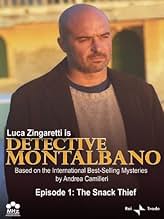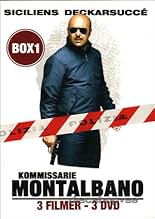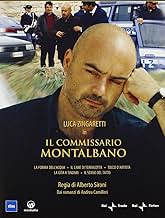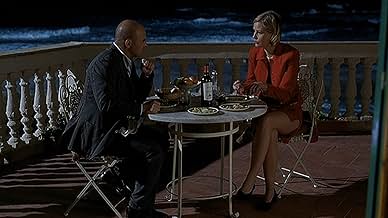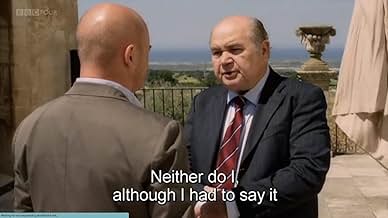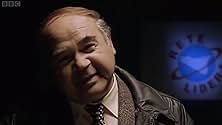El detective Montalbano resuelve crímenes en Sicilia.El detective Montalbano resuelve crímenes en Sicilia.El detective Montalbano resuelve crímenes en Sicilia.
- Premios
- 3 premios ganados y 2 nominaciones en total
Explorar episodios
Opiniones destacadas
I'm Italian and just want to give a few replies to your questions (sorry my English).
-"Why there are any people in the background?" The emptiness of places isn't just for a stylistic purpose, neither because of a low budget, but has realistic reasons: the show is set in a stereotypical group of little towns. Now there aren't jobs in country-lands and a lot, A LOT of people moved on in bigger cities or even in the north of the country or abroad. So the south of Italy is full of empty little towns, with spectacular views but just a little count of old people living in it and a lower one of the young. Often Montalbano moves between them and it's almost normal that there are few people and cars. A little bit is the director's choice, but it's more realistic than you think.
-Catarella is "too stupid for police"? He isn't stupid, he clearly has a sort of mental disease/neurodiversity. He has difficult in little everyday acts, but he also has skills in his job, so he can be a productive member of society. It isn't too unlikely. In Italy the state has to help disabled people who have difficulty finding work, paying them a little pension. So if possible public institutions prefer to hire them than pay them to do nothing. By low, all the public offices have to prefer disabled people for some jobs, if they are however able to do it.
-Italian men really behave and gesture that way? Yes, absolutely. I'm Italian and I ever notice any non-ordinary expression in Zingaretti interpretation and body language. He seems to me just strong and old fashioned manly, but not exaggeratedly expressive at all, so, yes, hand gestures are quite realistic. Infact, it's an Italian production, with Italian actors, it would make no sense to put a foreign stereotype about us for purpose. The stereotypes that you can find are all inner, as the old religious ladies and so on.
Now, my opinion? I like Montalbano and especially the work with regional language and the locations. Sometimes I think there is a little to much of machismo in it, but It's a traditional tv show. I really appreciate the mix of investigation, feelings an irony: I love detective story with a funny side, and I valuate more characterizations than action scenes, so it's my kind of show.
Now, my opinion? I like Montalbano and especially the work with regional language and the locations. Sometimes I think there is a little to much of machismo in it, but It's a traditional tv show. I really appreciate the mix of investigation, feelings an irony: I love detective story with a funny side, and I valuate more characterizations than action scenes, so it's my kind of show.
I really like this series of DVDs. I have read all of the novels by Andrea Camilerri and I think they have done a good job of capturing the "spirit" of Montalbano: he appreciates good food, beautiful women and chasing bad guys...not necessarily in that order as his long suffering girlfriend Livia finds out when he investigates a case while telling her they are on holiday.
Not speaking Italian, I have to read the subtitles, and they have done a very good job since I don't read particularly fast and I still don't have to resort to the pause button on the DVD player all that much.
The thing that I appreciate the most is the scenery of Sicily. Camilerri's books can't give you a true sense of how beautiful it "seems". I say "seems" because I find the portrayal of daily Sicilian life a little strange: there are hardly ANY people milling about in the background of most of the exterior shots. There isn't any real car traffic either. I don't know anything about Italian cinema so I can't say how common this might be. Perhaps there are union rules which make actor "extras" too expensive. I suspect it might be an artistic choice though. It certainly makes you want to visit this imaginary Sicily though: beautiful beaches and historic ruins completely devoid of tourists in T shirts and flip flops. Also, while Camilerri's books do indicate that Montalbano's house overlooks the beach...you don't really get a sense of how unrealistic that might be until you see it on the DVD: they must pay police detectives 20 times what they pay them in real life for him to afford his "house". After you see the house, you expect his car to be a Ferrari, but, strangely, it seems pretty ordinary.
To sum up, even if you aren't a huge fan of mystery or police procedurals, you can enjoy these DVDs simply for the stunning scenery: it might be better than actually going there and coming up against the realities of modern life.
Not speaking Italian, I have to read the subtitles, and they have done a very good job since I don't read particularly fast and I still don't have to resort to the pause button on the DVD player all that much.
The thing that I appreciate the most is the scenery of Sicily. Camilerri's books can't give you a true sense of how beautiful it "seems". I say "seems" because I find the portrayal of daily Sicilian life a little strange: there are hardly ANY people milling about in the background of most of the exterior shots. There isn't any real car traffic either. I don't know anything about Italian cinema so I can't say how common this might be. Perhaps there are union rules which make actor "extras" too expensive. I suspect it might be an artistic choice though. It certainly makes you want to visit this imaginary Sicily though: beautiful beaches and historic ruins completely devoid of tourists in T shirts and flip flops. Also, while Camilerri's books do indicate that Montalbano's house overlooks the beach...you don't really get a sense of how unrealistic that might be until you see it on the DVD: they must pay police detectives 20 times what they pay them in real life for him to afford his "house". After you see the house, you expect his car to be a Ferrari, but, strangely, it seems pretty ordinary.
To sum up, even if you aren't a huge fan of mystery or police procedurals, you can enjoy these DVDs simply for the stunning scenery: it might be better than actually going there and coming up against the realities of modern life.
Every episode is a feature film. Visually beautiful, great casting, musical language, solid mystery construction, expressive of human frailties. A little creepy with lots of older men with beautiful young women. Sure the formula shows thru after a few eps but I never tire of the country and expressive characters.
Set in Sicily, Italy, and based on a series of novels, INSPECTOR MONTALBANO has proved successful in various parts of Europe. I caught it on BBC4, the cultural channel of the BBC. It takes a lot to infuse what might be termed an over-familiar genre with touches of originality, but INSPECTOR MONTALBANO achieves this task successfully. This is chiefly due to the interplay between the three main characters (Luca Zingaretti, Angelo Russo, Cesare Bocci), who work successfully as a team yet continually bicker with one another. The shooting-style also helps; there is an extensive use of outdoor locations - as opposed to the uniformly gray interior sequences of many British detective series - and a greater reliance on pans and zooms, rather than shot/reverse shots. This gives the series an epic feel, despite the familiarity of the story lines. The scripts are tautly written with plenty of opportunities for throwaway lines from the main protagonists. Definitely worth a look as a refreshing alternative to Anglo-American detective series.
I am trying to understand why I like this series so much, and look forward to each new episode. There is so much quality in every aspect of these films it's hard to say what specifically is so attractive about them. Although the characters and the texture is pretty much the same across the series, each film has its own significant theme that keeps it interesting. It's more a thinking and feeling show about realistic people, magnificently done, than a show about physical violence.
We follow patient detective work slowly unraveling an intriguing mystery with unforeseeable twists ad turns, never as is often the case with detective series, unrealistically improbable. The stories present intriguing puzzles, always neatly and plausibly solved at the end (unlike many TV mysteries).
Many of the shows revolve around love stories, or multiple love stories. Romantic love is often the redeeming value in the lives of these people.
Montalbano is a dedicated, conscientious detective who is above all kind-hearted and compassionate, often even with people who comitted the crimes. He does not hate or revile them, he understands them, which is exactly why is he is good at his job. He is not your typical hard-boiled, depressed detective. He enjoys life, and he loves people. He has a stable long distance relationship with a wonderful woman. He doesn't have any mysterious powers of observation like Holmes, or an amazing power of logical deduction like Poirot. He relies on the exhaustive collection of facts and his acute insight into human nature to unravel the crimes. Much of the time we are watching him interview witnesses; we learn the background facts when his trusty assistants come to his office to quickly brief him after days tedious research we never see. I suspect there is more footage of him ecstatically eating traditional Sicilian dishes, for he is a serious and picky food connoisseur, as of him looking for clues at the scene of the crime. He has a small but elegant home right on the beach. On his beach he takes a daily morning swim before savoring an espresso on his patio. In the evening, when she is in town, he makes love to his beautiful partner. After solving a case, having witnessed the depths of human suffering and injustice, he heals himself with long walks by the ocean.
One reason to watch movies is to see exotic places. The films are loaded with gorgeous cinematography of gorgeous Sicilian scenery and cityscapes, as well as many gorgeous actors. These shows have the production values of fine cinema more than of TV shows or made-for-TV movies.
The show is also hilarious at moments. The comedy is character based, the brilliant portrayals of the foibles of the various main characters depend equally on the writing and the acting. The characters are unforgettable like the cuisine, complex, spicy and rich. The actors portray them down to the bones.
Another big plus is that the show is a cross-section of Italian and Sicilian in particular, culture and society. You can see into the social issues, and the peoples lives, much more than you can by merely being a tourist. For example, some shows deal with the mafia, some with immigration, some with violence against women.
I read a review that complained of the lack of action and violence. It's true, this is a detective series with the minimum of violence to move the story forward. The crimes of violence, and there are usually only one or two per episode, are portrayed in a way to capture the horror without any grind-house indulgence in sadism. I recall only one big shootout in all 34 episodes (through 2018). If you want violence and action, this is not the series for you. The stories are a chiaroscuro in which the acts of hatred and greed, that springboard the mystery plot, serve to bring forward contrasting love and compassion.
It also complained of overacting. If you have ever seen how people can react to the sudden and unexpected death of a parent, spouse or child, you know that this cannot be overacted. The performances are true. In many cases the sentiment is distilled, like wine into cognac, as is appropriate to portray the depths of feeling in a few moments on screen. People routinely bare their hearts to Montalbano, and so to us. This is a cross-section of human psychology, and a cross section requires cutting through the surface of reality to uncover the truth underneath.
We follow patient detective work slowly unraveling an intriguing mystery with unforeseeable twists ad turns, never as is often the case with detective series, unrealistically improbable. The stories present intriguing puzzles, always neatly and plausibly solved at the end (unlike many TV mysteries).
Many of the shows revolve around love stories, or multiple love stories. Romantic love is often the redeeming value in the lives of these people.
Montalbano is a dedicated, conscientious detective who is above all kind-hearted and compassionate, often even with people who comitted the crimes. He does not hate or revile them, he understands them, which is exactly why is he is good at his job. He is not your typical hard-boiled, depressed detective. He enjoys life, and he loves people. He has a stable long distance relationship with a wonderful woman. He doesn't have any mysterious powers of observation like Holmes, or an amazing power of logical deduction like Poirot. He relies on the exhaustive collection of facts and his acute insight into human nature to unravel the crimes. Much of the time we are watching him interview witnesses; we learn the background facts when his trusty assistants come to his office to quickly brief him after days tedious research we never see. I suspect there is more footage of him ecstatically eating traditional Sicilian dishes, for he is a serious and picky food connoisseur, as of him looking for clues at the scene of the crime. He has a small but elegant home right on the beach. On his beach he takes a daily morning swim before savoring an espresso on his patio. In the evening, when she is in town, he makes love to his beautiful partner. After solving a case, having witnessed the depths of human suffering and injustice, he heals himself with long walks by the ocean.
One reason to watch movies is to see exotic places. The films are loaded with gorgeous cinematography of gorgeous Sicilian scenery and cityscapes, as well as many gorgeous actors. These shows have the production values of fine cinema more than of TV shows or made-for-TV movies.
The show is also hilarious at moments. The comedy is character based, the brilliant portrayals of the foibles of the various main characters depend equally on the writing and the acting. The characters are unforgettable like the cuisine, complex, spicy and rich. The actors portray them down to the bones.
Another big plus is that the show is a cross-section of Italian and Sicilian in particular, culture and society. You can see into the social issues, and the peoples lives, much more than you can by merely being a tourist. For example, some shows deal with the mafia, some with immigration, some with violence against women.
I read a review that complained of the lack of action and violence. It's true, this is a detective series with the minimum of violence to move the story forward. The crimes of violence, and there are usually only one or two per episode, are portrayed in a way to capture the horror without any grind-house indulgence in sadism. I recall only one big shootout in all 34 episodes (through 2018). If you want violence and action, this is not the series for you. The stories are a chiaroscuro in which the acts of hatred and greed, that springboard the mystery plot, serve to bring forward contrasting love and compassion.
It also complained of overacting. If you have ever seen how people can react to the sudden and unexpected death of a parent, spouse or child, you know that this cannot be overacted. The performances are true. In many cases the sentiment is distilled, like wine into cognac, as is appropriate to portray the depths of feeling in a few moments on screen. People routinely bare their hearts to Montalbano, and so to us. This is a cross-section of human psychology, and a cross section requires cutting through the surface of reality to uncover the truth underneath.
¿Sabías que…?
- TriviaAlthough he is a fan of the show, Montalbano creator Andrea Camilleri has openly stated that Luca Zingaretti's characterization differs somewhat from how he had originally envisioned the character. Camilleri poked fun at this in one of the books, where it's acknowledged that the TV series exists in the Montalbano universe. Specifically, Montalbano himself states that, unlike Zingaretti (who's also 11 years younger), he has a full head of hair.
- ConexionesFeatured in Montalbano and Me: Andrea Camilleri (2014)
Selecciones populares
Inicia sesión para calificar y agrega a la lista de videos para obtener recomendaciones personalizadas
Detalles
- Fecha de lanzamiento
- País de origen
- Sitio oficial
- Idiomas
- También se conoce como
- Detective Montalbano
- Locaciones de filmación
- Punta Secca, Santa Croce Camerina, Ragusa, Italia(Montalbano's Home)
- Productoras
- Ver más créditos de la compañía en IMDbPro
Contribuir a esta página
Sugiere una edición o agrega el contenido que falta

Principales brechas de datos
What is the Japanese language plot outline for Il commissario Montalbano (1999)?
Responda
